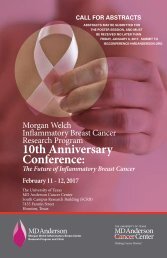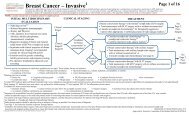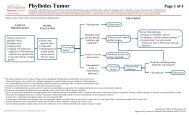MEDICINE
1YkigAQ
1YkigAQ
Create successful ePaper yourself
Turn your PDF publications into a flip-book with our unique Google optimized e-Paper software.
Education<br />
Division Fellowship Programs<br />
Hematology/Medical Oncology<br />
Fellowship Program<br />
38<br />
THE UNIVERSITY OF TEXAS MD ANDERSON CANCER CENTER<br />
DoCM-based Trainees by Type<br />
In addition to the division-level Hematology/Medical<br />
Oncology Fellowship Program, the DoCM departments host<br />
numerous specialty training programs for graduate medical<br />
education as well as observerships, internships, and even<br />
high school students.<br />
224 Rotating Residents<br />
127 Postdoctoral Fellows<br />
76 Graduate Research Assistants<br />
73 Fellows<br />
8 College Students<br />
4 Research Interns<br />
3 Research Medical Students<br />
2 High School Students<br />
2 Observers<br />
519 Trainees<br />
The 15 candidates who began their first year of the Division of Cancer<br />
Medicine’s Hematology/Medical Oncology Fellowship Program in July<br />
2015 were among 436 contenders to apply through the National Resident<br />
Matching Program.<br />
Robert Wolff, MD, program director,<br />
Alyssa Rieber, MD, faculty associate<br />
program director (not pictured),<br />
and Catherine Butler-Gunn, JD,<br />
(pictured) associate director of the<br />
DoCM Graduate Medical Education<br />
Program, partner to manage this<br />
premier fellowship. Michael Kroll,<br />
MD, professor of Hematology, serves<br />
as faculty associate program director<br />
for Hematology. The fellowship offers<br />
12 to 18 months of clinical rotations,<br />
didactic learning, and the opportunity<br />
to engage in research. Based on their<br />
interests, fellows can pursue one of four tracks. The physician-scientist<br />
track provides training for basic and translational oncology research. The<br />
clinical-investigator track provides training focused on the development<br />
and implementation of therapeutic and prevention-oriented clinical trials<br />
and associated correlative studies. The master-clinician track prepares<br />
fellows interested in community-based practice. The fourth track is for the<br />
future clinician-educator who wishes to pursue an academic position with<br />
a focus on subspecialties in medical oncology, hematology, or hematology/<br />
oncology. Fellows can also pursue master’s degrees in science, public<br />
health, or education.<br />
Our second-year fellows take care of patients with a variety of cancers at<br />
the Lyndon B. Johnson General Hospital (LBJ) under the supervision of MD<br />
Anderson faculty. Rieber, assistant professor of General Oncology, is the<br />
program director and chief of medical oncology at LBJ. She and Arlene<br />
Nazario, MD, clinical associate professor of General Oncology, provide<br />
daily supervision and mentor fellows as they manage patients at the Harris<br />
County campus. The fellows also participate in a board review curriculum<br />
that involves case-based instruction.<br />
In FY14, Richard Champlin, MD, then ad interim division head, took on<br />
the role of co-principal investigator for the T32 training grant as Waun Ki<br />
Hong, MD, prepared to step down as leader of Cancer Medicine. Michael<br />
Davies, MD, PhD, associate professor of Melanoma Medical Oncology<br />
and director of fellowship research, provides immeasurable support and<br />
guidance to the fellows in their research endeavors. The T32 training<br />
program grant received a perfect score on its Ruth L. Kirchstein National<br />
Research Service Award renewal application with the National Institutes of<br />
Health. Notice of funding to support seven fellows was received in 2015 at<br />
the level of $472,243 (total cost) a year for five years.<br />
• Cancer Rehabilitation<br />
• Consultation-Liaison Psychiatric<br />
• Oncology/ Psychosomatic Medicine<br />
• Genitourinary Medical Oncology<br />
• Hospice and Palliative Care<br />
• Immunotherapy<br />
• Investigational Cancer Therapeutics<br />
• Leukemia<br />
• Lymphoma/Myeloma<br />
• Medical Oncology International<br />
• Melanoma Oncology<br />
• Neuro-Oncology<br />
• Sarcoma Medical Oncology<br />
• Stem Cell Transplantation and<br />
Cellular Therapy<br />
• Susan G. Komen Interdisciplinary<br />
Breast Cancer<br />
• Symptom Control and Palliative Care<br />
• Thoracic/Head and Neck<br />
Medical Oncology<br />
The July 2016 incoming class has already been selected. Division<br />
leadership is expecting to greet 14 new fellows — arriving from residency<br />
programs including John Hopkins University School of Medicine, Duke<br />
University, The University of Texas Southwestern Medical Center, and<br />
Vanderbilt University.






